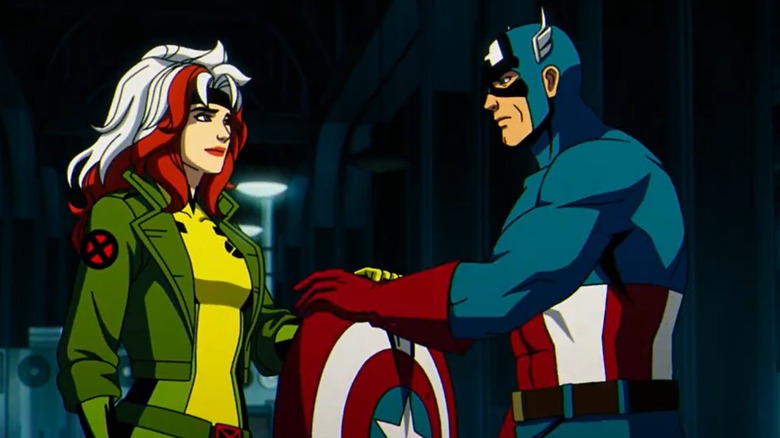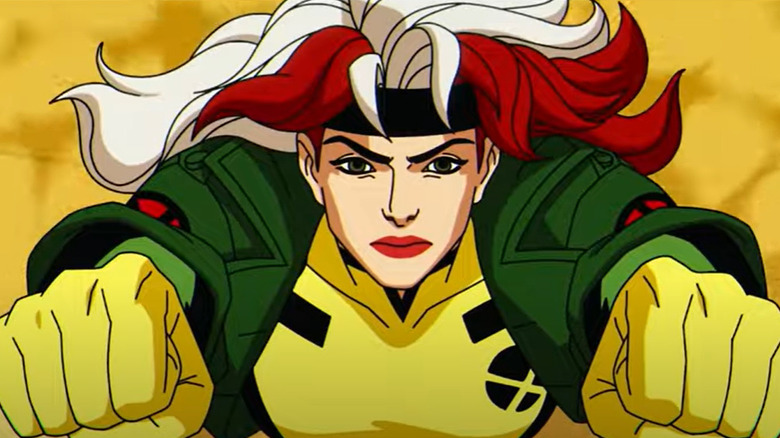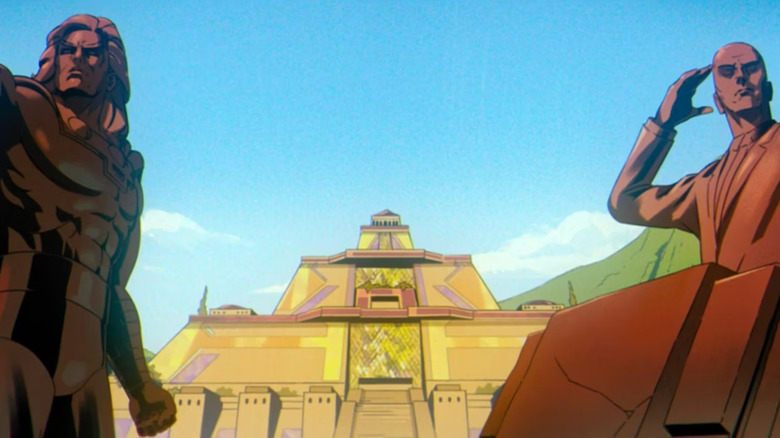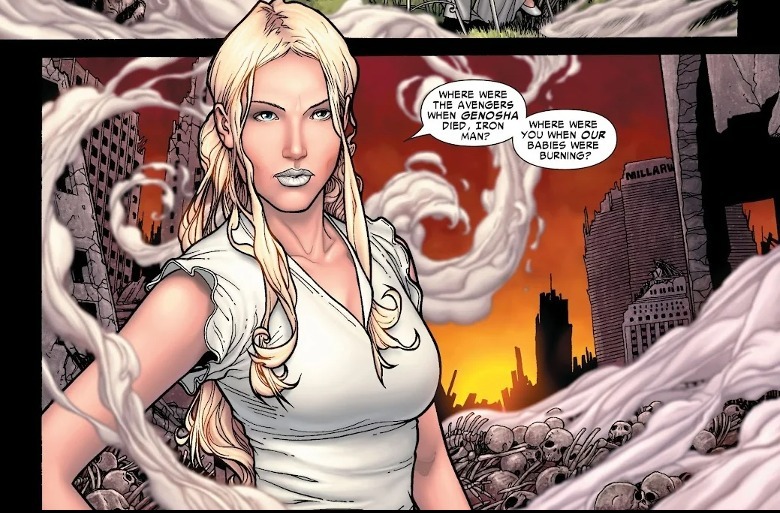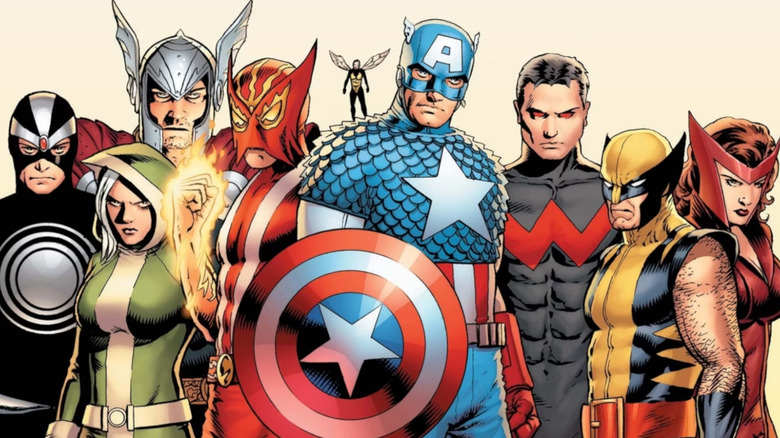X-Men '97 Finally Features The Marvel Crossover We've Been Waiting For
This article contains spoilers for "X-Men '97."
I'm the precise age to have been introduced to the Marvel Universe by animation and film. Back then in the bygone 2000s, superhero movies never crossed over and the best that us wee fans could hope for was, say, the X-Men playing guest star on "Spider-Man" for an episode or two. I've now evolved into a curmudgeon who thinks superhero cinema could use more individuality and less interconnectivity, but I digress.
All this is to say that "X-Men '97" episode 7, "Bright Eyes," featured the sort of brief guest appearance that would've made 10-year-old me super-excited: Rogue meets Captain America (Josh Keaton). You might recall that Cap appeared back in the original "X-Men" cartoon; the season 5 episode, "Old Soldiers," showed him and Wolverine on a mission together in World War II. We've known for two weeks that Cap would be showing up (thanks to the mid-season trailer), but it's only now been confirmed that he made his way to the present. He also name-drops "his team," definitely the Avengers.
Marvelites frustrated by the Avengers and X-Men still not teaming up in the Marvel Cinematic Universe are probably thrilled right now. But it's not a happy meeting. Rogue is reeling from the Genosha massacre in episode 5, "Remember It," and seeking revenge on Sentinel creators Henry Gyrich and Bolivar Trask. Cap is hunting Gyrich too, but staying within the confines of the law. He tries to talk her down to seeking justice by the book, but Rogue calls him "America's top cop" and throws his shield too far for him to chase her.
This headbutting isn't new territory for the X-Men and The Avengers — and it might portend a more violent turn for some of these merry mutants.
X-Men '97 has sent Rogue, and the Marvel Universe, to a dark place
Rogue is in a dark place during "Bright Eyes." She fights with resolve and ruthlessness. When she finds Trask, who nearly jumps into a guilt-driven suicide, she catches him, saying he should find true redemption by living — or not, because once he talks, she then drops him to his death. The episode has its cake and eats it too by revealing Trask has been made into a sturdy Sentinel hybrid, but Rogue's killing intent was there. It reminds me of when "Batman" comics wanted to show Robin II Jason Todd was a bad egg, so he let a criminal fall to his death (in "Batman #424).
But really, can you blame her? Rogue was at ground zero of a pogrom and felt her lover die in her arms. Yet, humanity still tells her to live on their terms and that mutants' needs are secondary. The longer you stay an "X-Men" fan, the more you'll start to think Magneto is right. Mutants are relentlessly feared and hunted, and even the smallest victories are torn from them by the narrow-minded. (This goes back to the "illusion of change" that Marvel Comics floats on, but it's frustratingly similar to the slow turning of real social progress.)
It's no coincidence that President Robert Kelly, when telling Cyclops why he can't send more aid to Genosha, uses the rhetoric that defined the last three U.S. presidential elections: "Sure I suck, but be happy because if I lose the election, the other guy would be even worse."
"X-Men" is a story about tolerance, which series supervising producer/head director Jake Castorena told /Film was something "97" had to get right. So far, the show has been pretty daring, showing that tolerance is not something that children of privilege generously bestow upon grateful minorities — nor should it be.
For the X-Men, is Professor X's dream dead?
Rogue isn't alone; other X-Men are losing their patience with humanity too.
Wolverine cheers Rogue "killing" Trask. In "Remember It," Cyclops snapped during a TV interview with reporter Trish Tilby, calling out how mutants must still "prove [they're people]" for all the normal humans. In "Bright Eyes," Tilby visits Genosha with the X-Men. Standing before mutant graves with Beast, she raises concern about human fear and "smashed windows." Beast, ever polite, refrains from yelling at her but cuts her down all the same: "Perhaps the Professor's vision for the future was too nearsighted, and begging for your tolerance was our first mistake."
Magneto is in the hands of big bad Bastion right now, but he'll be free eventually. Once he is, I can't imagine he'll return to being the aspiring hero we saw at the climax of episode 2, "Mutant Liberation Begins." The events of Genosha have vindicated his past militancy and this time, I wouldn't be surprised if some of the X-Men join him on his crusade. A not-small part of me would be rooting for them. (See: Brian Michael Bendis' 2013 "Uncanny X-Men," where Cyclops, Magneto, and White Queen Emma Frost went underground as fugitives, fighting for mutant rights outside the law.)
So where do the Avengers fit in? It's a comic tradition to put the two teams at odds. After all, the Avengers are beloved public celebrities (it doesn't help that the MCU intertwined them with the U.S. military-industrial complex), so "X-Men" writers use them as representatives of the anti-mutant status quo. They aren't bigots, but they aren't going the extra mile to help mutants. I wouldn't mind at all if "X-Men '97" includes this bit from "Civil War" (by Mark Millar and Steve McNiven) where White Queen Emma Frost dresses down the Avengers.
The future of Marvel Mutants in X-Men '97
If Cap comes back, or we get even more Avengers cameos in "X-Men '97," is there a way to bridge this divide?
In 2012, Marvel began publishing the title "Uncanny Avengers" (initially written by Rick Remender). In this book, the Avengers admit they've largely failed their mutant colleagues in the past. Their solution is a new team, the Avengers Unity Squad, which combines members of the Avengers (Captain America, Thor, Scarlet Witch, Wasp, and Wonder Man) and the X-Men (Rogue, Wolverine, Havok, and Sunfire). During Mike Carey's run on "X-Men Legacy," Rogue — who spent so long needing guidance — learned to be a leader (while hooking up with Magneto). She carried those lessons during "Uncanny Avengers." I'd love to see that growth for my favorite flying southern belle in "X-Men '97."
On the other hand, "Uncanny Avengers" becomes (intentionally or not) a story about minority assimilation. Adding mutants to the Avengers line-up is meant to win the X-Men public support by association. This is not the kind of tolerance endorsed by "X-Men '97" so far; rather, differences should be acknowledged and are not cause for hatred. In issue #5, Havok tells a press conference he wants the term "mutant" (the "m" word) to be discarded altogether, which reads much like facile pleas for colorblindness. The issue caused a stir among X-Men fans.
As superhero fans, it's fun to throw our favorite action figures together. However, we could all be well-served to think through what such stories mean.
"X-Men '97" is streaming on Disney+, with new episodes released on Wednesdays.
